B2B2C Ecommerce - Changing the rules of business for Enterprise Brands
Traditionally, when we thought about the business models for enterprise brands, the choices were binary. Brands either operated on the B2B model or they served end consumers through the B2C model. Many businesses still operate the same way. But for many others, the siloed business models were no longer viable and more importantly profitable.
Choosing either of the business models meant limited, linear growth. And enterprise brands, revving for disruptive growth could no longer be stuck with business models that had no room for horizontal growth.
The changed market dynamics demanded multi-level changes in the way businesses were set up and operated. To aim for unrestrained growth enterprises needed a brand new business model that could set them on the path of multi-channel growth. Along with a complete overhaul of their existing ecosystem enterprise brands needed to combine the goodness of B2B and B2C into a single business model.
That’s when B2B2C ecommerce happened!
Table of Contents
- B2B2C Business Model- Blurring The Lines For Unrestrained Growth
- Why Are Enterprise Brands Opting For B2B2C?
- Why B2B2C Business Model Is A WIN-ALL Strategy
- How Enterprise Brands Are Nailing Success With Different B2B2C Setups
- The Challenges Of Launching A B2B2C Ecommerce Brand
- Why Choose StoreHippo To Build Your Unique B2B2C Ecommerce Brand
- Conclusion
B2B2C Business Model- Blurring The Lines For Unrestrained Growth
Business to business to customer, as the name suggests, made it possible for enterprise brands to cater to the end buyers as well as other business. In a typical B2B2C set up the originating brand to sells its products or services to other brands. These brands in turn, work as third party vendors/service providers to eventually pass on the products or services to the end buyers.
By adopting the B2B2C model, an organization combines the elements of B2B and B2C to offer highly personalized and engaging experiences to the end buyers. To put is simply the original brand sells its products to other business and end customers simultaneously. B2B2C business model can further evolve into a variety of novel hybrid business models making it possible for large-scale businesses to create out-of-box ecosystems for disruptive growth.
Why Are Enterprise Brands Opting For B2B2C?
It is inevitable for a high-performing brand to eventually reach a growth plateau. Scaling beyond that point requires substantial effort, resources and time. Alternative the same can be achieved through smart partnerships with other businesses that have already carved a niche for themselves.
By pivoting to the B2B2C model and strategically partnering with the industry-best sellers and service providers enterprise brands can scale up rapidly and maximise their growth opportunities. Working as a single brand with multiple businesses as partners also helps the enterprise brand to offer the best products and service to its buyers in a cost effective manner.
To chart a winning strategy using the B2B2C business model, both the original enterprise brand and its partner brands/businesses should be aligned in their strategies. Tapping new markets and customers becomes easy when both brands offer additional value to the customers which were otherwise unattainable by either of the bands involved.
Why B2B2C Business Model Is A WIN-ALL Strategy
To understand it better, let us consider the example of B2B2C ecommerce food delivery platforms. The food aggregator brand offers a unified platform for various restaurants, eateries and take-away joints to come together and serve a wide customer base. While the sellers on the aggregator platform bring a diverse cuisine onboard, the food aggregator brand adds value by facilitating the sellers with streamlined and fast delivery service.
As a result, end customers trust various sellers more because these sellers carry the assurance and quality certificate of the aggregator platform. Also different popular restaurants add to the credibility and value proposition of the B2B2C food aggregator.
To put it together, all parties involved benefit from the Business to business to consumer model as below;
The Enterprise Brand
Sample some benefits of the disruptive B2B2C model for enterprise brands:

Adds to brand value by showcasing a rich product and service catalogue of different seller brands
No need to invest in an inventory based model as each business comes with its own rich inventory set
Easily reaches new customer segments by selling ancillary products or services by onboarding new businesses as partners
Collect detailed customer behaviour and buying pattern data to plan strategic business and marketing moves
The Vendors
Just like enterprise brands, let's see how B2B2C model translates into profitable benefits for the vendors.
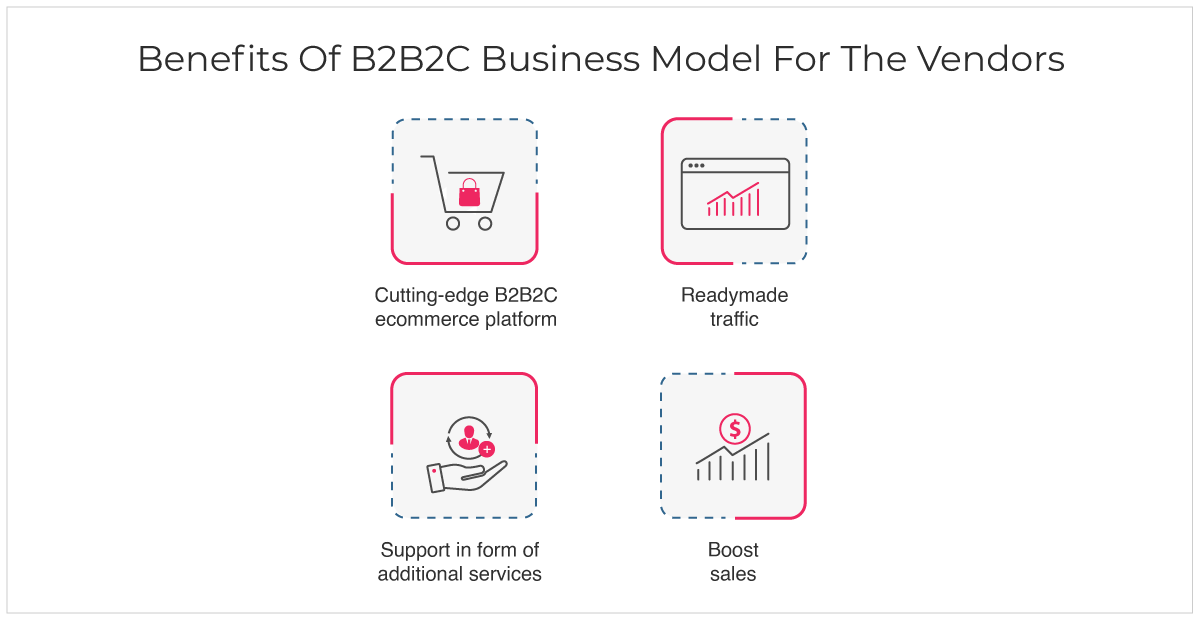
Get a cutting-edge B2B2C ecommerce platform to reach customers on multiple touchpoints like apps, online stores, social media channels and any other new-age channels
Benefit from the readymade traffic of the enterprise brand
Get support in form of additional services like logistics, customer support, marketing etc. from the enterprise brand
Boost sales with help of strategic insights offered by the B2B2C brand
The Customers
Customers benefit just as much as the brands and marketplace vendors on this win-win-win model.
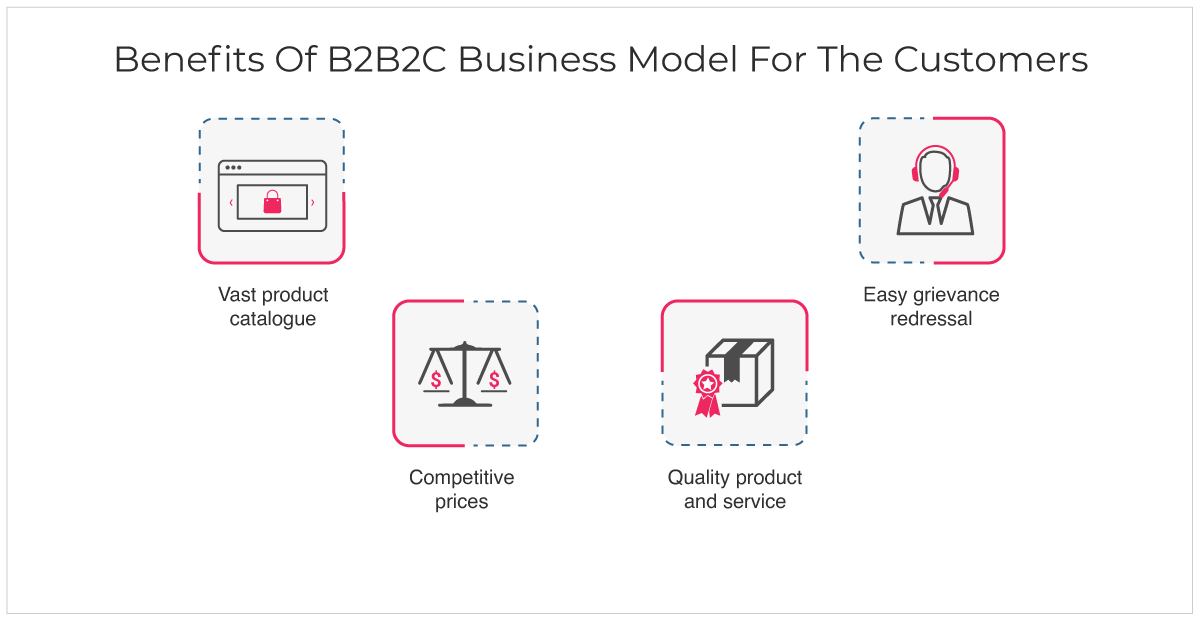
Get a one-stop-shop with a vast product catalogue
Competitive prices thanks to multiple seller businesses
Quality product and service assurance from a reputable brand
Easier to register grievances (if any) and get them resolved
The B2B2C model is a winning equation for every party involved. While the enterprise brand and its seller business partners can easily scale up to new markets the customers get top-notch products and services which were otherwise not possible of avail.
How Enterprise Brands Are Nailing Success With Different B2B2C Setups
The versatility and opportunities to scale exponentially have made the B2B2C business model a favourite of enterprise brands. Different enterprise brands across industry verticals have employed the model to their advantage and recorded unprecedented success.
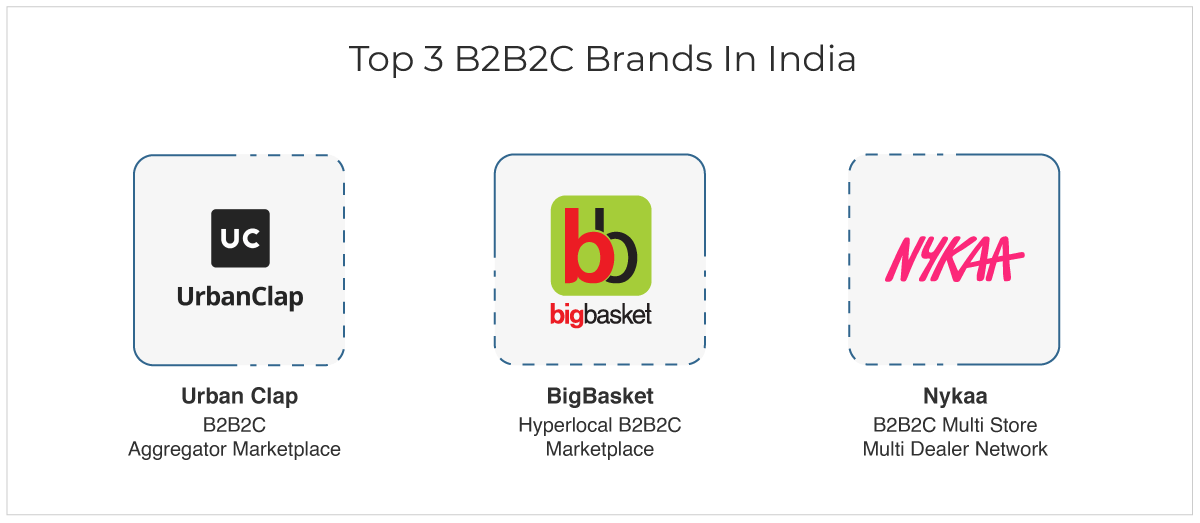
Here are some of the successful B2B2C examples from the real world:
Urban Company: The B2B2C Aggregator Marketplace
Established in 2014, Urban Company ( previously known as Urban Clap) is a successful service aggregator marketplace serving its end customers through its vendor partners. The unicorn brand uses its B2B2C ecommerce portal and marketplace app to help customers choose their favourite vendors and service providers.
Catering primarily to two segments, home services and salon, Urban Company registered 13.3% growth in 2021. Currently operating in 40 cities the brand plans to cover 100+ cities by 2023. Urban Company also plans to diversify its service portfolio.
How Urban Company Perfected The B2B2C Aggregator Model To Its Advantage
Built a service aggregator marketplace to onboarded service providers from the unorganised home services sectors like cleaning, plumbing, repair etc.
Identified m-commerce as the most effective channel to engage and convert buyers
Launched strategically personalised marketing campaingns through different channels to target different customer segments
Gave customers the freedom to customize their packages to reap the benefits of hyper-personalization
Offered training and supporting equipment to its service providers to ensure top notch service
BigBasket: The Hyperlocal B2B2C Marketplace
Founded in 2011, BigBasket boasts of 9 million monthly active users across 32+ cities in India. The hyperlocal B2B2C marketplace delivers grocery, milk, bakery, poultry and other everyday essential at the customers’ doorstep. BigBasket sells 40,000+ products from 1,000+ brands by delivering 35000 orders a day (approx.).
Expanding to new cities and by adding new product lines, Bigbasket has recorded gross sales worth $2 billion in the year 2021. The popular grocery delivery brand grew 80% from financial year 2020 and is expected to keep growing rapidly.
Source: Warc
How BigBasket Nailed Hyperlocal Ecommerce With Its B2B2C Online Marketplace
Built a hyperlocal marketplace website and apps to connect with customers on multiple touchpoints
Onboarded 2000+ hyperlocal stores as vendors for quick local delivery
Leveraged m-commerce to offer seamless buying through apps and also offered support through chatbots for quick grievance resolution
Top-notch SEO that ranked BigBasket B2B2C marketplace on top SERPs for grocery and other products
Personalised marketing through apps that gentle nudged buyers towards bigger ticket size
Nykaa: The B2B2C Multi Store Multi Dealer Network
Founded in 2012, Nykaa the multi-brand beauty and personal care B2B2C marketplace uses its dealers and distributors network to run a multi-billion rupees business. Nykaa recieves over 1.5 million orders every month and has over 15 million registered users as of June 2021. The beauty marketplace’s yearly revenue was 22 billion rupees in the fiscal year 2022.
Started as digital-native brand, Nykaa also introduced its own line of cosmetics, personal care and clothing items to grow vertically as well as horizontally. The brand went omnichannel by opening its first offline shop in Delhi in 2020.
How Nykaa Nailed Hyperlocal Ecommerce With Its B2B2C Online Marketplace
Built a multi store multi dealer network for different cities where the beauty products dealers were onboarded as vendors on their online marketplace
Orders were delivered quickly by channeling the orders through the dealer neares to the customer location
Omnichannel business model to give the buyers the ultimate phygital buying experience by selling through website, apps and offline stores across different cities
Created multiple online stores catering to different product lines like drugstore beauty products, luxury beauty products, cross border beauty brands marketplace and wholesale marketplace for beauty professionals. Also, diversified the brand into fashion and lingerie marketplaces by selling own brand as well as onboarding other brands as vendors
Cutting-edge tech solution to power and run the hybrid B2B2C set up combining multiple store, online marketplace and omnichannel business models
The successful examples of B2B2C ascertain one thing for sure, the versatility of the model helps it morph into different disruptive business models. With the right strategy, product and market understanding powered by a future-ready tech solutions, enterprise brands can leverage the B2B2C model for unparalleled growth.
The Challenges Of Launching A B2B2C Ecommerce Brand
Going B2B2C presents an enterprise brand with unlimited growth opportunities, albeit, the whole set up and comes with its own set of challenges. While B2B2C primes brands to gain an edge over competitors, the model has the following challenges:
Identifying the right businesses to partner with your enterprise brand
Making it easy for different partner brands to showcase their products and services without facing discriminatory or lopsided competition
Finding an easy to use and comprehensive tech solution for your partner brands so they can manage and grow their business through your B2B2C platform
Real-time sharing of customer data and records of inventory, stock etc. to avoid broken flows
Customer ownership and having a shared responsibility towards sharing customer data as well as helping customers have a seamless buying experience on the platform
Sourcing and leveraging a cutting-edge technology solution that can streamline and automate various aspects of your business
Having creative control to implement quick changes to your B2B2C business model to adapt to changing market and customer demands
Creating personalized buyer journeys for different customer segments across channels
Making quick changes to pricing, discounts, shipping etc. to get maximum ROI from marketing and customer targetting
Seamless integrations with the software and service providers of your choice to streamline multi-level operations of the B2B2C business
Scaling the business on the product, B2C partners, customers, geographies and any other levels
A successful B2B2C venture requires strategic thinking and dedicated efforts from both the enterprise brand and other B2C brands involved in the partnership. Shared data and customer ownership are the challenges which brands need to handle by mutual understanding. Other than that, the tech challenges can be easily handled by partnering with StoreHippo the future-ready B2B2C ecommerce platform.
Why Choose StoreHippo To Build Your Unique B2B2C Ecommerce Brand
StoreHippo enterprise ecommerce platform is designed for the extensive requirements of large enterprise brands. Designed grounds-up on the mobile-first technology, StoreHippo offers the following advantages to brands planning their B2B2C transition:
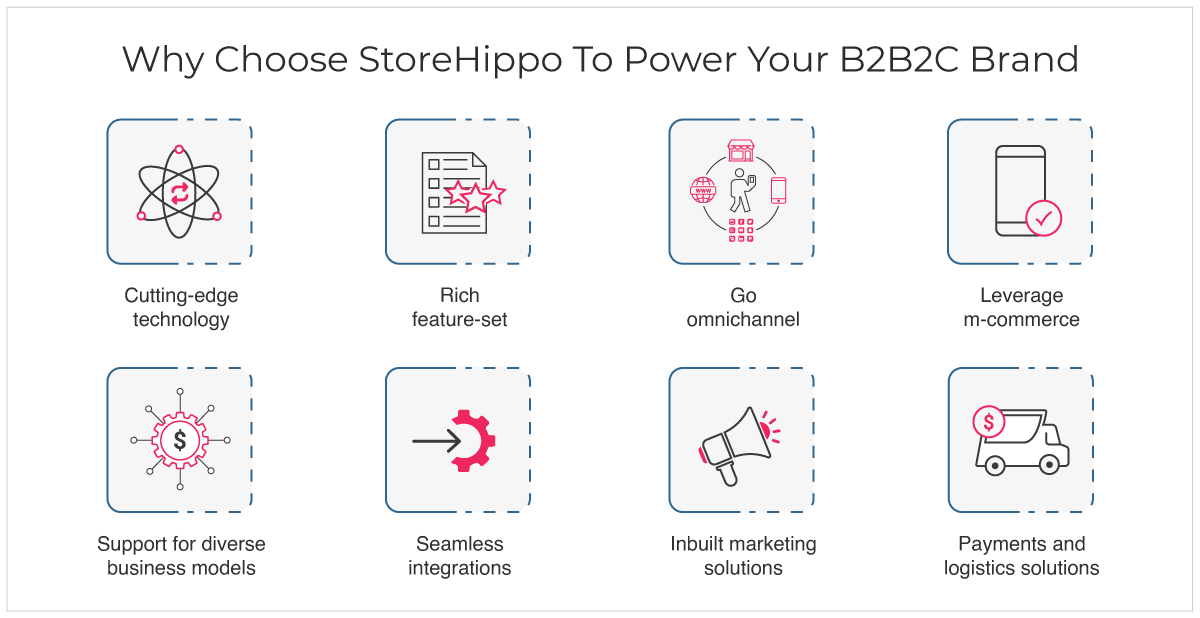
Cutting-Edge Technology
Designed on future-ready MACH (Microservices, API-first, Cloud-native, Headless) architecture, StoreHippo gives enterprise brands the freedom, flexibility and agility to build tailor-made B2B2C solutions for their brand. The flexible architecture makes it possible for brands to tweak the platform inside out, extend the entities or create new ones for their unique needs.
Rich Feature-Set
StoreHippo comes with 300+ built-in features that enable B2B2C brands to experiment with diverse business models and flows. With its gamut of features and tools StoreHippo enables enterprise brands to launch, pivot and scale their business using one single platform .
Go Omnichannel
Modern buyers prefer to connect with brands across 4-6 channels. Using the decoupled headless architecture StoreHippo enables B2B2C brands to use the same backend logic and APIs to create new frontends in record time.
Leverage M-Commerce
Mobile is where modern buyers are. StoreHippo comes with complete m-commerce solution for brands. From building PWA stores to building Android and iOS apps, StoreHippo makes it easy for brands to use the mobile channel to boost customer engagement and conversions. StoreHippo also comes with a host of inbuilt B2B2C apps like the admin app, vendors app, delivery boy apps etc. to manage the complete business on the go.
Support for Diverse Business Models
Storehippo comes with native solutions for multi vendor marketplace, muti-store ecommerce, hyperlocal amrketplace, B2B ecommerce, D2C, B2C, multilingual solutions etc. The plug and play solution does not require additional apps or extensions to build hybrid B2B2C solutions by mixing and matching these advanced business models. With battle-tested solutions StoreHippo accelerates the online transition and offers the shortest time-to-revenue for B2B2C brands.
Seamless Integrations
StoreHippo comes with 150+ pre-integrated solutions and seamlessly integrates with the preferred software and service providers of enterprise brands. By integrating with the best-in-breed solutions and software StoreHippo makes the enterprise operations and processes efficient. B2B2C brands can easily integrate with their chosen ERP, CRM, accounting, marketing, logistics or payments solutions using StoreHippo APIs.
Inbuilt Marketing Solutions
StoreHippo SEO-ready ecommerce platform comes with a host of inbuilt marketing solutions to help B2B2C ecommerce businesses strategize their marketing for maximum returns. Brand s can also build dynamic marketing pages on the fly to personalize marketing. The powerful blog engine, discount engine, inbuilt reporting and analytics tools and SEO components make it easy for brands to promote their B2B2C platform for maximum reach. Also, StoreHippo can be easily integrated with popular mailing tools, analytics tools and other marketing tools for data-driven marketing.
Payments and Logistics Solutions
StoreHippo has 60+ pre-integrated payment gateways along with 30+ integrated logistics solutions providers to make checkouts and deliveries seamless. StoreHippo’s inbuilt delivery boy solution helps B2B2C brand and its partner B2C brands manage their own fleet of delivery boys to ensure fast and streamlined deliveries.
StoreHippo offers a 360-degree B2B2c ecommerce solution for brands across industry verticals and geolocations. The one-stop solution has powered enterprise brands that have created a niche for themselves.
Conclusion
While B2C and B2B business models offer liner solutions for running a business B2B2C comes with a different approach of targeting and winning customers. By choosing the right partners and building a robust, future ready B2B2C platform, brands can penetrate new markets and leverage different sales channels to register unparalleled growth.
When done right, using data-driven strategies, markets and products, the B2B2C model can pay rich dividends. Enterprise brands need to chalk out win-win partnerships with their partner businesses and facilitate them with the right IT solutions to grow their business.
B2B2C model is fast making a mark in the ecommerce segment. Brands looking forward to adopt it can write their own success story by choosing the combination of business models and set ups that best suits their business. For trusted ecommerce solutions they can rely on StoreHippo enterprise solution that comes with inbuilt B2B2C features.
Looking forward to explore B2B2C model for your brand? Book your free StoreHippo demo to get started right away.
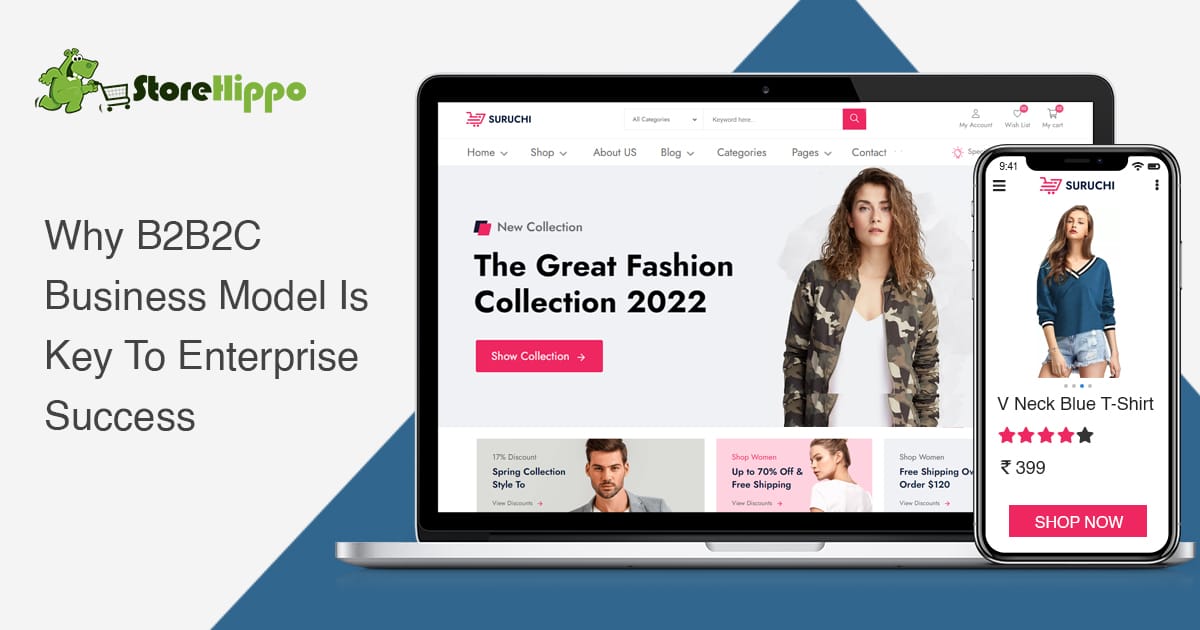





















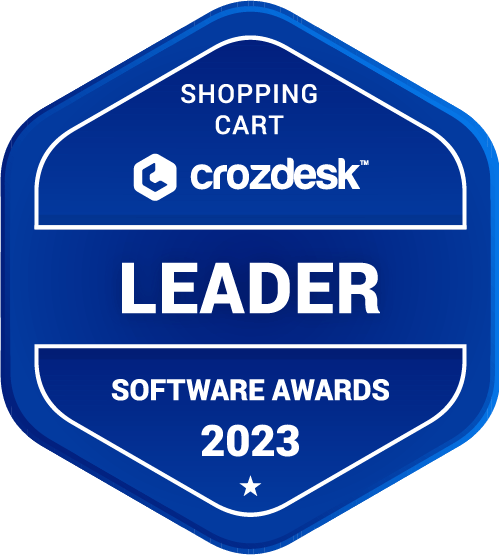
4 Comments
Leave a Reply
Leave a Reply
Leave a Reply
Leave a Reply